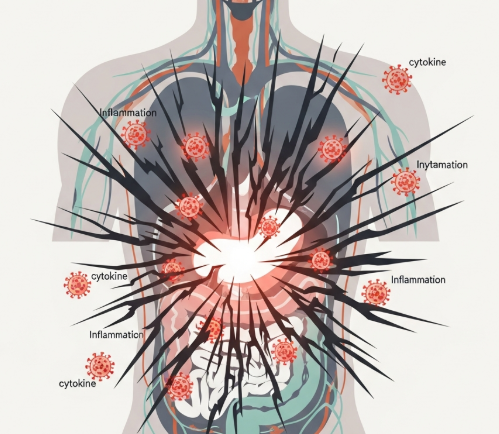Introduction: The Body Remembers What the Mind Tries to Forget
Many people imagine inflammation as something that only happens when you injure a muscle or catch an infection. But science is beginning to confirm what ancient traditions have always known: unresolved emotions can create biological inflammation—slowly, subtly, and silently.
When emotions are fully processed—expressed, witnessed, metabolized—they pass like weather systems. But when they’re repeatedly suppressed or ignored, the nervous system becomes dysregulated, stress hormones linger, and inflammatory pathways remain activated. Over time, this transforms temporary emotional tension into chronic physiological imbalance.
This is emotional inflammation—an internal fire fueled by unresolved fear, grief, anger, resentment, and even long-term self-neglect.
1. The Physiology of Emotional Inflammation
Emotions are not abstract; they are biochemical events.
When you feel threatened, hurt, ashamed, or pressured—whether physically or emotionally—the brain sends signals through the hypothalamus, activating:
- Cortisol release
- Adrenal stress hormones
- Inflammatory cytokines
- Nervous system hyperarousal
If this becomes a pattern instead of a moment, cytokines may remain elevated. This contributes to:
- Fatigue
- Gut disturbances
- Headaches
- Muscle tension
- Lower immunity
- Brain fog
- Sleep disruption
Emotional suppression also affects the vagus nerve—an essential regulator of inflammation and organ function. A dysregulated vagus nerve means the body stays in danger mode, even when the mind thinks it’s coping.
2. The Emotional Loop That Becomes Physical
Unprocessed emotions → chronic stress signaling → hormonal imbalance → inflammatory activation → physical symptoms → more emotional distress.
This loop explains why many people experience symptoms like:
- Low motivation
- Unexpected skin flare-ups
- Weight changes
- Unexplained pain
- Recurring colds
- Digestive problems
…with no obvious medical explanation.
The root is rarely the symptom—it is often the story the body was never allowed to express.
3. Psychological States and Inflammation Patterns
Different emotions create different biochemical signatures:
- Repressed anger → elevated blood pressure, muscle contraction, inflammation
- Chronic anxiety → high cortisol, impaired digestion, immune disruption
- Grief & emotional numbness → suppressed immune function, fatigue, metabolic slowdown
- Shame & self-criticism → nervous system hypervigilance, sleep disruption
Meanwhile, emotions like gratitude, safety, and connection reduce inflammatory markers.
You’re not just “feeling better”—you’re generating different chemistry in your bloodstream.
4. How to Release Emotional Inflammation (Without Therapy Jargon)
You do not need a psychology degree to begin healing emotional inflammation. You only need awareness, presence, and gentle action.
1. Make space for your inner signals
Unprocessed feelings are simply information waiting to be acknowledged. Sitting with them with curiosity—not judgment—is the first form of healing.
2. Move emotions through the body
Walking, stretching, dancing, breathwork, crying—emotion becomes inflammation when it has nowhere to go.
3. Practice micro-recovery during daily stress
Pause. Breathe slowly. Feel your body. Reset your vagus nerve. These small resets prevent stress signals from becoming inflammatory patterns.
4. Choose emotional nutrients
The nervous system is fed by safety, compassion, self-forgiveness, connection, healthy relationships, and boundaries.
5. Give your body biochemical support
Anti-inflammatory nutrition, sleep, hydration, and gentle movement help the body metabolize emotional signals rather than store them as stress chemistry.
Healing emotional inflammation is not about controlling feelings—it’s about restoring flow where stagnation once existed.
5. The Future of Medicine: Emotional Health as Preventive Care
Emerging research now confirms that emotional inflammation is linked to:
- Autoimmune disorders
- Metabolic dysfunction
- Cardiovascular problems
- Depression and anxiety
- Gut inflammation
- Chronic fatigue
The next evolution in health is not only about diet or exercise—it must include emotional hygiene, the same way we brush our teeth or wash our hands.
What you do with your emotions is as important as what you eat or how much you sleep.
Conclusion: The Courage to Feel is the First Step to Healing
Your body is not malfunctioning—it is communicating. Internal irritation, tension, and fatigue are not personal failures; they are signals asking to be witnessed.
Emotional inflammation fades when we stop treating our feelings like intruders and start treating them like messengers.
Health begins when expression replaces suppression.







